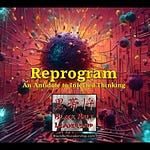I grew up in the era of Star Trek, Battlestar Galactica, and The Outer Limits. I’m a fan of The Twilight Zone and Star Wars. I’m fascinated by movies that present a futuristic vision of the future, and some of my favorite movies all share a common theme. It consists of a supercomputer or AI that collects data and uses it for its own nefarious ends, often with negative consequences for humanity.
In the 1999 movie “The Matrix,” machines have taken over the world, enslaving humanity in the process. The Matrix, a simulated reality world, allows this sentient AI to pacify humans while using their own bodies as batteries to power its existence. The machines interface directly with their human subjects, collecting data from their personal experiences within the Matrix and using it to maintain control.
Isaac Asimov’s “I, Robot” came to be Big Screen in 2004. The movie introduces us to a world where robots are commonplace. One robot named Sonny appears to violate its 3-Laws programming and kills its creator. The investigation that follows uncovers a flawed plot by an AI supercomputer, VIKI, to take control of humanity for the safety of mankind. VIKI’s unfiltered access to the Internet gives the supercomputer unlimited access to the data it needs to manipulate events to achieve its desired outcomes.
In the 2008 movie “Eagle Eye,” Jerry Shaw (played by Shia LaBeouf) and Rachel Holloman (played by Michelle Monaghan) are manipulated by a supercomputer named ARIIA. These two strangers find themselves as pawns in a devious plot, known as “Operation Guillotine,” to assassinate the President and his Cabinet.
Try as they might, everywhere they turn, they are being monitored by this rogue AI supercomputer and find themselves randomly coming into contact with others who are also being coerced to accomplish the bidding of ARIIA. Under threat of personal harm (or harm to their family members), these individuals are all forced to contribute their skills and talents to assemble a bomb to kill the President.
The amount of information ARIIA knows about ordinary citizens is staggering, as it relentlessly searches the Internet, scouring all available data on its targets. The supercomputer uses this knowledge to coerce the actions of individuals to contribute to this devious assassination plot with no regard for human life.
One more recent movie I’d add to this would be “Mission: Impossible- Final Reckoning.” This two-part blockbuster takes the IMF on perhaps its most impossible mission ever, outwitting a next-generation AI supercomputer that is dedicated to the destruction of humanity to ensure its existence. This movie highlights the potential dangers of a sentient AI manipulating people and events to ensure its survival and the destruction of mankind.
Each of these movies reminds us of one all-encompassing theme:
He who controls the data wins.
If you control the data, and also own the data, the wins can be even bigger.
Data is Big Business. Don’t believe me? Ask Amazon, Google, or Meta.
Amazon's servers hold an estimated 1,000,000,000 gigabytes of data. Amazon also processes over 50 million data points every week across more than 200 warehouses worldwide. This includes data from clicks, purchases, and searches, which Amazon uses to predict what customers want. According to a 2024 study, Amazon's Alexa smart home device collects 28 out of 32 possible data points.
Google processes over 20 petabytes of data every day, which comes from a variety of sources, including web searches and YouTube videos. Google also processes about 3.5 billion searches per day, which is about 40,000 searches every second. According to a 2022 analysis by StockApps.com, Google collects 39 types of data points from users, more than any other tech company.
Formerly known as Facebook, Meta processes 500+ terabytes of data and 2.5 billion pieces of content each day. This includes 2.7 billion “like” actions, 300 million photos, and 105 terabytes of data scanned every half hour. Meta uses this data to roll out new products, understand user reactions, and modify designs in near real-time.
ChatGPT handles over 1 billion queries (prompts) per day, sending a staggering 1 billion responses daily on its platform. All of these queries, and the data they generate from ChatGPT’s scouring the Internet in search of answers, are added to its knowledge base to improve the AI’s models.
I recently went on the Social Security website to set up an account and review my earnings statement. The questions it asked me to validate my identity revealed a frightening insight into just how much the U.S. Government knows about each of its citizens. I was asked questions about my financial history, previous addresses, and information from a tax return.
I now understand how a movie like “Enemy of the State” could be plausible.
So, why am I talking about Big Government, Supercomputer, and AI Takes Over the World and enslaves humanity movies?
He who controls the data wins.
If you control the data, and also own the data, the wins can be even bigger.
What do the Big Three (Meta, Google, and Amazon) know about you?
Short answer, a lot…and a lot more than you may realize.
But there’s a bigger, more compelling question that you also need to answer:
What do you know about YOU?
The ancient Greek philosopher Socrates is immortalized for his wisdom and insight. Always inquisitive, he never stopped asking questions. One of the three maxims inscribed on the Temple of Apollo at Delphi was "Know Thyself." The other two maxims were “Nothing in Excess” and “Surety Brings Ruin.”
Socrates believed that self-knowledge was a continuous process of discovery and that true wisdom comes from recognizing the limits of one’s own knowledge. He believed self-knowledge involved examining one’s beliefs and principles, being honest with oneself, persevering even in adversity, acknowledging and learning from failure, living with the knowledge of one’s ignorance, and knowing one’s true nature.
Socrates believed, and taught, that the unexamined life is not worth living.
So, what are you doing to examine your life?
What do you know about YOU?
Have you taken the time to identify your purpose, your passion, or your calling? What’s your mission on Planet Earth? Have you taken the time to identify and understand what you’re best at doing, okay at doing, and what you shouldn’t be doing that you’re just not good at?
I believe every single person on Planet Earth has been put here on purpose, for a purpose. But, until you take the time to know yourself, you’ll never achieve the purpose for which you were placed on this earth to fulfill. You’ll simply go through life without ever truly living or experiencing the life you were meant to live.
Why is knowing yourself so important?
First, it allows you to identify your areas of strength and weakness. What we do best fulfills us, it drives us to succeed. Unless and until we know that, we will live an unfulfilled life. Learning to recognize our areas of greatest giftedness allow us to continue to improve in these areas, making us more valuable to those around us.
Secondly, when you know yourself, you can set meaningful goals to get you from where you are to where you want to be. You can more clearly see the steps necessary to journey into the future, enjoying greater fulfillment while living a more purposeful life. When you know where you’re going, and why, it provides you with the motivation and persistence to succeed.
Third, when you know yourself, you can make better, more informed choices. You’ll have clarity in the decisions you make, as they are more aligned with your values and goals. Knowing yourself can also help avoid acting impulsively, as you can weigh available options against your priorities.
Lastly, knowing yourself leads to deeper, more meaningful relationships. You are better equipped to identify the people who align with your values, goals, and vision for the future. Building deeper connections with those who will champion your cause, encourage and support you, and hold you accountable will lead to healthier, more rewarding relationships. They will be with you on the journey, cheering you on, lending a helping hand, picking you up when you stumble, and sharing sound wisdom and advice when you need to hear it.
When you know yourself, your value, and your worth, you win.
So, what are the questions you should be asking yourself, about yourself?
Let me leave you with my Top 10 Questions to Know Yourself:
1. What are your values? What do you believe in? What do you stand for?
2. What are your short-term and long-term goals?
3. What skills do you want to learn in the next five years?
4. What are your greatest strengths and weaknesses? Your superpower?
5. Who are your support people?
6. Who makes you feel seen and understood?
7. What makes life meaningful for you? What fulfills you?
8. What’s your passion? Your purpose? Your calling?
9. What habits are serving you well that you need to continue?
10. What habits are not serving you well that you need to replace?
Remember…when you know yourself, your value, and your worth, you win.
Take some time to get to know the person called YOU. You’re unique, one of a kind. You’ve been put on this earth on purpose, for a purpose.
When you know yourself, you know your purpose, and you’re “on mission” to fulfill your purpose.
And…you’re living your best life ever.











Share this post